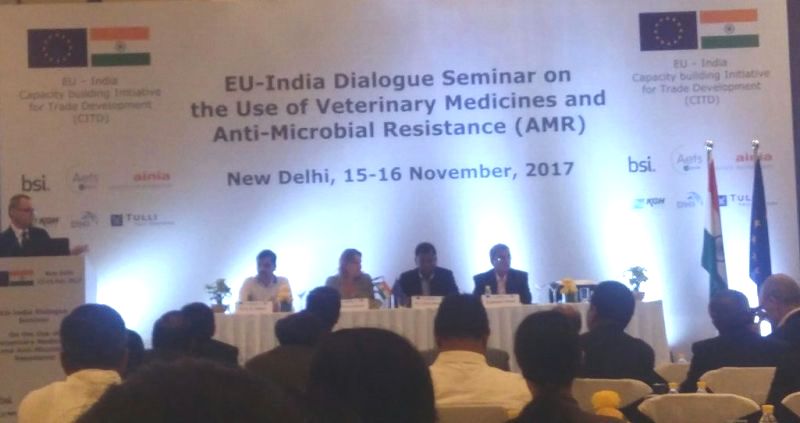
Prudent use of antimicrobials in livestock production is one of the key strategies participating to the One Health Approach to Antimicrobial Resistance being promoted by FAO, WHO and OIE. In this context, a two day dialogue seminar is being organized at THE GRAND hotel, from 15 – 16 November 2017 in New Delhi to create an opportunity for gathering and exchanging information on respective legislations on the control of registration and use of Veterinary Medicines and to stimulate scientific and institutional cooperation between India and EU towards promoting practices giving enhanced guarantees to authorities and consumers on the safety of animal production, whilst contributing to the implementation of strategies to combat antimicrobial resistance.
The control of the registration and proper use of veterinary medicines is key to ensure that livestock and aquaculture products produced in India comply with the safety requirements of the countries where they are sold, in order to minimize exposure of populations to harmful residues. Assurance that banned substances are not used in animal production is also critical in this regard. The presence of residues in excess of authorized limits (MRL) and presence of banned substances in livestock and aquaculture products exported from India is detrimental to the development of its exports. Their detection in consignments may lead to rejection, delisting of export commodities in question and the implementation of safeguard measures such as increased frequency of checks at the borders in importing countries, thus affecting the whole sector.
Besides, the inadequate use of anti-microbial veterinary medicines, like that of antibiotics in human health, has been clearly identified as a main reason for the emerging and steady increase of microbes that are resistant to antimicrobial treatments. This phenomenon called Anti-Microbial Resistance (AMR), has become a global public health threat. Combatting it, particularly the resistance to antibiotics, is a high priority of all governments and public health institutions worldwide. In Europe, an estimated 25,000 deaths are attributable to antibiotic-resistance infections, costing 1.5 billion Euros annually in direct and indirect costs (EMA and ECDC 2009). In India, although accurate estimates of the overall burden of resistance are not available, it is estimated that 58,000 neonatal deaths are attributable to sepsis caused by resistance to first-line antibiotics each year. The transmission of AMR to humans may occur from contact with animals (including food), other humans, and the environment. Transmission is facilitated by several factors, including high population density, lack of access to clean water, suboptimal sewage systems, poor sanitation, and poor healthcare infection control practices, all of which are more common in low- and middle-income countries (LMIC}.
In this context, it is essential that cooperation and mutual understanding is strengthened at international level and in particular between Indian and European scientific communities in order to develop and implement strategies to mitigate the risks caused by such threats (i.e. on the health of populations and on the trade in products of animal origin), towards ensuring an adequate level of protection of consumers' health in India and the EU, whilst not impeding trade.










